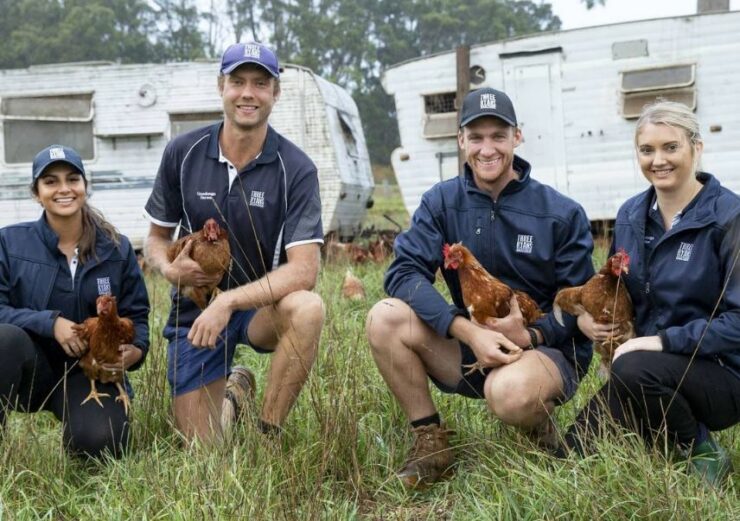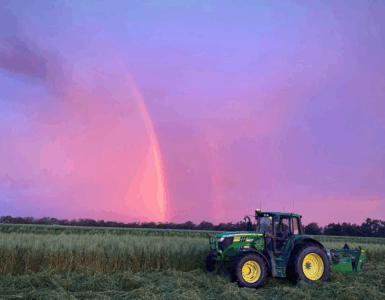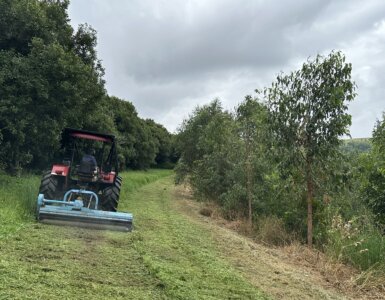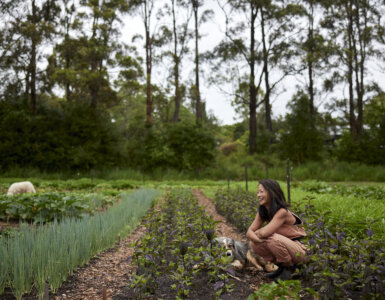If we had to crown a vegetable king in Australia – Jake Ryan would be a contender. He grows cauliflower, broccoli, cabbage and kale, all the while producing cows, sheep and chickens for pasture-raised eggs.
It’s little wonder he’s been recognised in the 2022 Farmer of the Year Awards for Excellence in Diversification. The success of his operation is closely linked to his passion for soil biology and regenerative farming on his family property at Manjimup in Western Australia called Three Ryans.
To do all that well, Jake says he maintains a strict routine. Every Monday, they pick cauliflower, broccoli and kale. Tuesday is cabbage day. Wednesday is for transplanting.
Diversification the cushion against costs
Diversification helps deliver a good income regardless of external factors. “The whole benefit of it is, if something is having bad pricing or the cost of production for that product goes up, hopefully something else will be there that will make up for the downfall of the other one,” Jake explains.
If bad pricing or the cost of production for that product goes up, hopefully something else will be there that will make up for the downfall.
That side of the farm has always worked efficiently, but Jake is bringing his own special touch to the property. While studying agribusiness at Curtin University, Jake’s dad encouraged him to look into the work of American regenerative farmer Joel Salatin. Jake was inspired to make some changes.
Introducing regen ag
“When I got back to the farm, the first year was just learning the ropes to see how dad, grandad and my uncle were doing things. I learned the basics and then started progressing into slowly adapting our farm to regen principles.”
Becoming the first farmer to bring a strip-tillage machine into Western Australia was a turning point. It’s a method whereby the ground is only ploughed where the seedling goes, the rest of the paddock is untouched.
“What that allowed us to do was go from five tillage passes to just one, to get the transplant in the ground. In one season, it saved us 10,000 litres of fuel over 60 acres,” he says.
Jake is also starting to plant flowers amongst the crops, such a sunflowers, marigolds and alyssum to bring in beneficial insects.
We’re trying to mimic nature, whereby we bring in biodiversity.
“Instead of having a monoculture, we have a polyculture. So, we don’t have to spray as much.”
At Three Ryans, only half the land is used for grazing at any one time.
“We initially started rotational grazing as a trial because we weren’t sure how sheep would go with wires and electric fences. They’re normally disobedient as they are, but they loved it!
“They learnt not to go near the white tapes and stayed in their area. That trial worked well, and then we adapted it across the whole farm.”
Livestock boost soil for veg growing
Bringing that all together, the Ryans grow vegetables for one year, followed by pasture for four years. That cover cropping for four years, builds the soil up for the vegetable phase.
The veggies degrade the soil and the livestock and pasture bring it up. So, hopefully it’s a net positive.
The cover crops are varied with barley, oat, legumes and clovers. “We don’t eat the same thing every day. The sheep and cows don’t like to eat the same thing every day.” Jake has observed the stock eat a lot more on a more varied diet, building their weight more quickly.
Jake is also a bit of a chemist, tinkering with his own, very cost effective, fertiliser. “I thought, how hard could it be?” Natural acids like citric and acetic are incorporated along with kelp to spray across the pasture.
The add-ons have been well received by his dad.
“They’re supportive but they do ask questions, so I have to have the reasoning there about why it’s going to work. That makes me want to learn more so I can explain it in depth.”
Message for consumers
If there’s something he wishes consumers could see, it’s the benefit livestock can have on the natural environment.
“Horticulture is normally quite destructive to soil life. With tillage, you’re killing off a lot of microbes, killing off carbon. A lot of fertilisers get used, even organics.
“There are organically certified ones but I always like to say – it’s probably not correct – but if you spray a paddock with snake venom, it’s organic but it’ll kill ya,” he laughs.
“We use the livestock to build the soil up. We do a lot of agri-tourism and the message we are trying to get out there is, if livestock are raised correctly, they are actually quite beneficial to the environment.”
Jake’s motto is think big, start small and scale fast. Three Ryans, are certainly giving the rest of us a bit to think about too.
Hear more stories just like Jake’s by subscribing to the Telling Our Story podcast on iTunes (or wherever you listen to podcasts) and follow podcast host Angie Asimus on Instagram for more updates.







































Maybe a little late, but congratulations on taking out the young farmer award. There are two key ways to go in farming and that it to specalise and go huge, e.g. a single species or diveristy.
Good to see you have gone the diversity route with lots of different products. It does mean more investment in a greater range of tools and networks but it also allows you to build systems.
I am a hobby farmer just getting into veggies but also have a variety, cows, chickens, sheep, goats Alpaca’s. I agree it is a hard slog but there are opportunities to for us to work together, help each other and leverage. I am hoping to make a contribution there with a online farmers market that allows farmers like Ryan to set up a table and sell there products with the benefit being like a traditonal farmers market of leveraging off the other farmers to provide a greater range and draw in the customers. You can check out my site http://www.thefarmerslot.com.au